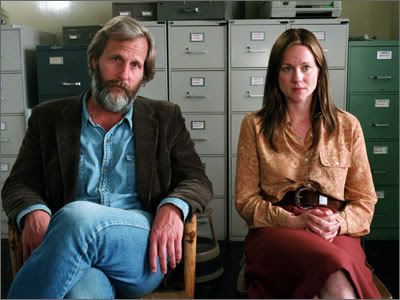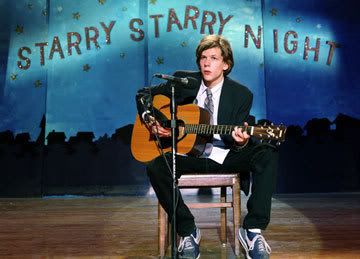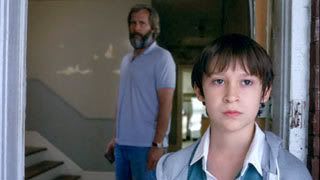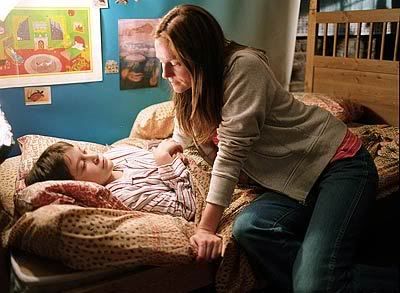
Noah Baumbach, friend of director Wes Anderson, wrote and directed the 2005 The Squid in the Whale, constructed from his own experiences and drenched in nostalgia. In a short 81 minutes we are drawn inside the insular world of a family going though a divorce and simultaneously love, hate or empathise with the different family members. The split is eminent from the very start of the film and there is not much hope of the family reconnecting fully. Instead, the film focuses on the emotional consequences of the break-up and the effects it has on the family members.
The family in question are the Berkmans, a middle-class New York family headed by two intellectual parents, the magnificent Laura Linney and Jeff Daniels. Bernard is the worst type of bourgeois intellectual, a pompous author with a couple of hefty tomes to his name and an overloaded ego. He is currently teaching a literature class at the local college, where he gets to reign supreme of his awed students. He attempts to bring this reverence back to the home, where his status as Family Patriarch is very much in effect, especially at the beginning of the film. His two children, Walt (Jesse Eisenberg) and Frank (Owen Kline) are very much in awe of their dad, with Walt especially influenced. There are a number of moments where we see Walt trying to emulate his father, talking knowledgably about books or films he’s never actually read. There’s a very funny scene where Walt’s girlfriend, Sophie, tries to discuss Kafka’s The Metamorphoses with him. Despite Walt having recommended her the story, he has never read it himself and fumbles through a conversation, before referring to it, redundantly, as “Kafkaesque“. It’s very funny and sweet and is very true in the way we tend to act around people we’re trying to impress.

Baumbach is very upfront about the character of Bernard. Lots of people have highlighted this character’s nastiness as a failing of the film. Without redemption, without a single true moment of kindness, of letting his true emotions show, the film loses something and the character becomes a cliché. On the audio commentary, Baumbach recognises this (although in not so many words) and freely admits that he did not want this man to have an epiphany, to find redemption or even to seem at all like a nice guy. The screenplay was apparently based on his own experience of his parents’ divorce. If so, that means Bernard is drawn from the director’s own dad. Not an exactly attractive family portrait to paint, but true to life and perhaps we can forgive Baumbach this.

Laura Linney is the mother of the family, and it’s a very warm performance. The last film I saw Linney in was playing Jim Carrey’s wife Meryl in The Truman Show, another complex character, although the vibrant day-go colours of that film are starkly contrasted with the muted pastels of The Squid and the Whale. Whereas Meryl was a bright, sunny woman of the 50’s, Joan Berkman is much more subdued, with long tousled hair and soulful eyes. She has had affairs with other men, but we can understand her motives, her frustration and her longing to get away from Bernard. She retreats into her new relationship with Ivan (William Baldwin) and her new career as a writer (becoming more successful than her ex-husband, much to Bernard’s annoyance) but never neglects her two children. It’s a very touching look at a woman and motherhood, and you get the feeling Baumbach is fond of his own mother.
 All the way though the film I was reminded of The Graduate, on which I expounded my love on here. The subject matter in the films are totally unalike, but the overall tones were very similar. The cinematography, broad shots and warm, almost sepia tones lend a humane and melancholy feel to the film, which the handheld cameras add to. There’s none of the glossiness or harshness that is so natural in today’s films. In The Graduate, music by Simon & Garfunkel filled the voids in the dialogue with a suitable sadness, in The Squid in the Whale the same method is used, this time from Bert Jansch and Lou Reed. Folksy, introspective, hopeful guitar music illustrates many moving moments throughout the film. The moment that defined my feelings toward the film was when Walt enters his mother’s house unexpectedly and we hear “Heart Like A Wheel” by the McGarrigle sisters playing on her stereo. The McGarrigles (mother and aunt of Rufus Wainwright) are probably the defining music of my childhood. My parents listened to them a lot and I grew up with their albums, so to hear their music in a film (thankfully a gentle enjoyable one such as this) was both a shock and a delight. I was able to emotionally connect with the storyline both on terms of it’s own plot and emotion, but also from my own memories and personal experiences. It was a weird, transcendent moment and it was then when I knew I really, really liked the film.
All the way though the film I was reminded of The Graduate, on which I expounded my love on here. The subject matter in the films are totally unalike, but the overall tones were very similar. The cinematography, broad shots and warm, almost sepia tones lend a humane and melancholy feel to the film, which the handheld cameras add to. There’s none of the glossiness or harshness that is so natural in today’s films. In The Graduate, music by Simon & Garfunkel filled the voids in the dialogue with a suitable sadness, in The Squid in the Whale the same method is used, this time from Bert Jansch and Lou Reed. Folksy, introspective, hopeful guitar music illustrates many moving moments throughout the film. The moment that defined my feelings toward the film was when Walt enters his mother’s house unexpectedly and we hear “Heart Like A Wheel” by the McGarrigle sisters playing on her stereo. The McGarrigles (mother and aunt of Rufus Wainwright) are probably the defining music of my childhood. My parents listened to them a lot and I grew up with their albums, so to hear their music in a film (thankfully a gentle enjoyable one such as this) was both a shock and a delight. I was able to emotionally connect with the storyline both on terms of it’s own plot and emotion, but also from my own memories and personal experiences. It was a weird, transcendent moment and it was then when I knew I really, really liked the film.



1 comment:
'The Squid and the Whale' was one of those films I meant to see when it was in the cinema. It seemed like a great film but I forgot about it and your review's sparked my interest in it again.
Post a Comment